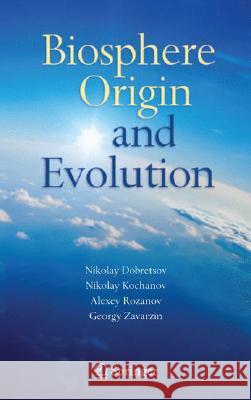Biosphere Origin and Evolution » książka
Biosphere Origin and Evolution
ISBN-13: 9780387686554 / Angielski / Twarda / 2007 / 437 str.
Modern natural science shows that the infancy of life on Earth experienced prebiotic evolution and included the emergence of primitive self-reproducing biologic forms and their systems. The subsequent coevolution of inorganic environment and biologic systems resulted in global propagation of life over the Earth and its enormous diversification. Diverse living organisms colonized the land, water, and atmosphere, as well as upper layers of the lithosphere, thereby forming the biosphere. Formerly, it was thought that abiogenic synthesis of prebiotic matter occurred in the Earth s atmosphere on land surface. However, the presence of life signs in rocks more than 3. 5 Gyr old suggests that the chemical matter evolution stage with synthesis of organic compounds from simple molecules is more likely to have occurred in the preglobal circumstellar disk together with the RNA world and the emergence of life itself. This notion removes the restriction imposed by the Earth s age and environmental conditions on the young Earth. It is favored by detection of intricate organic compounds on meteorites, comets, and (according to spectral data) in gas dust nebulae. The detection of life traces in meteorite bodies of the same age as the Earth and the Solar System indicates that life in the latter can be older than the Earth as documented by geologic records. The key features of living systems allowing their existence in time and space are self-reproduction and ability to evolve. The inseparability of these features was expressed by N. V."











